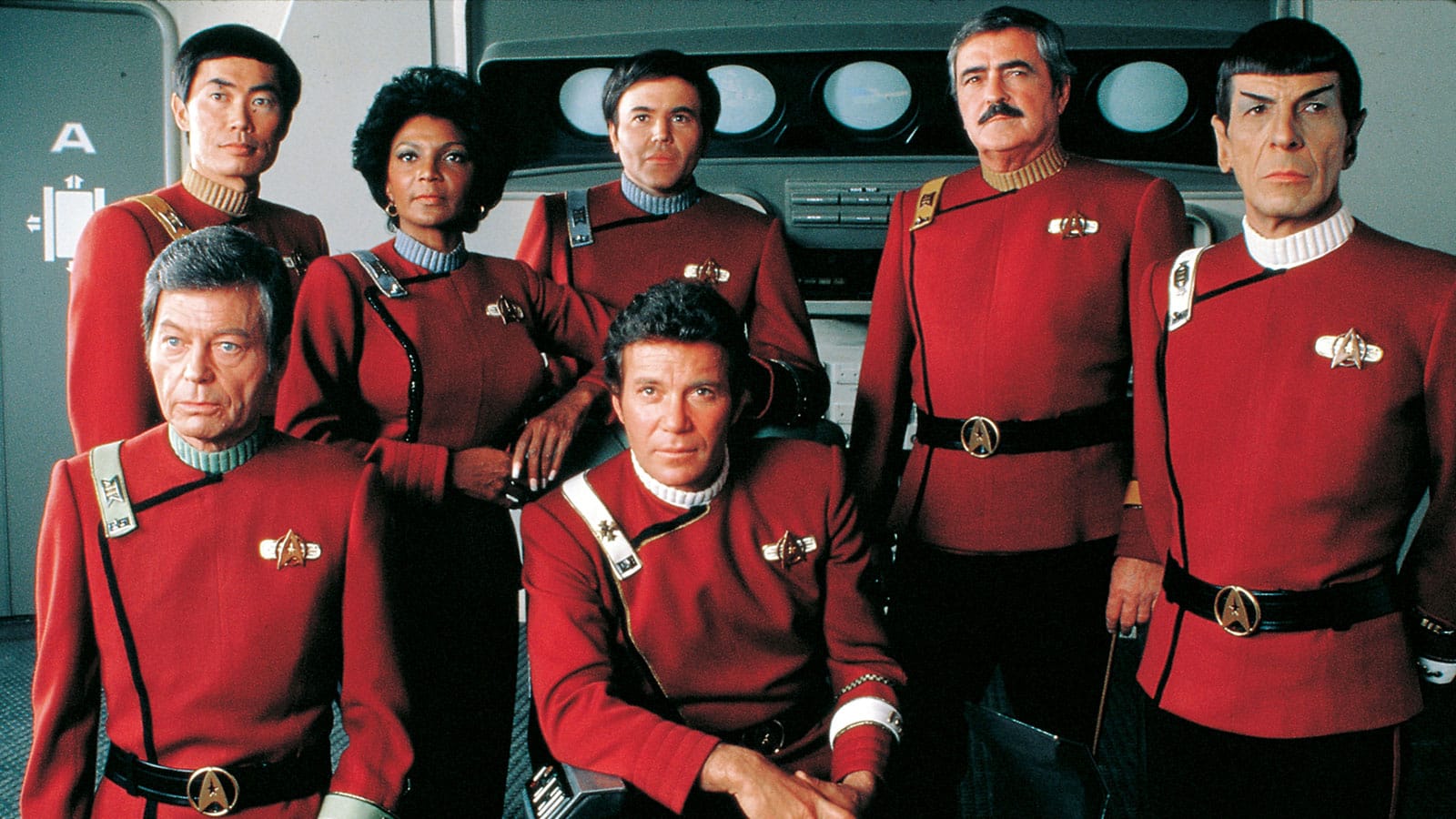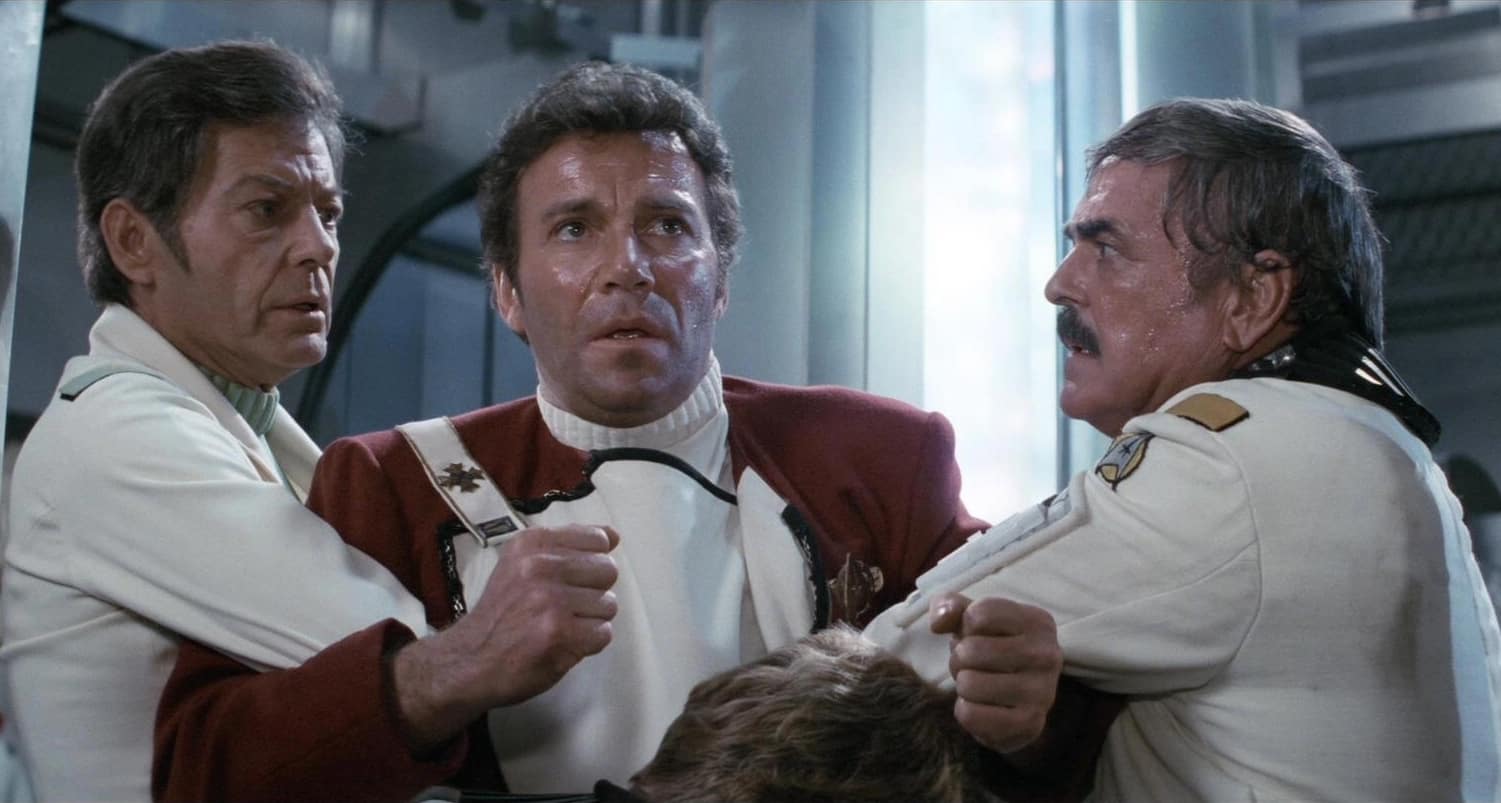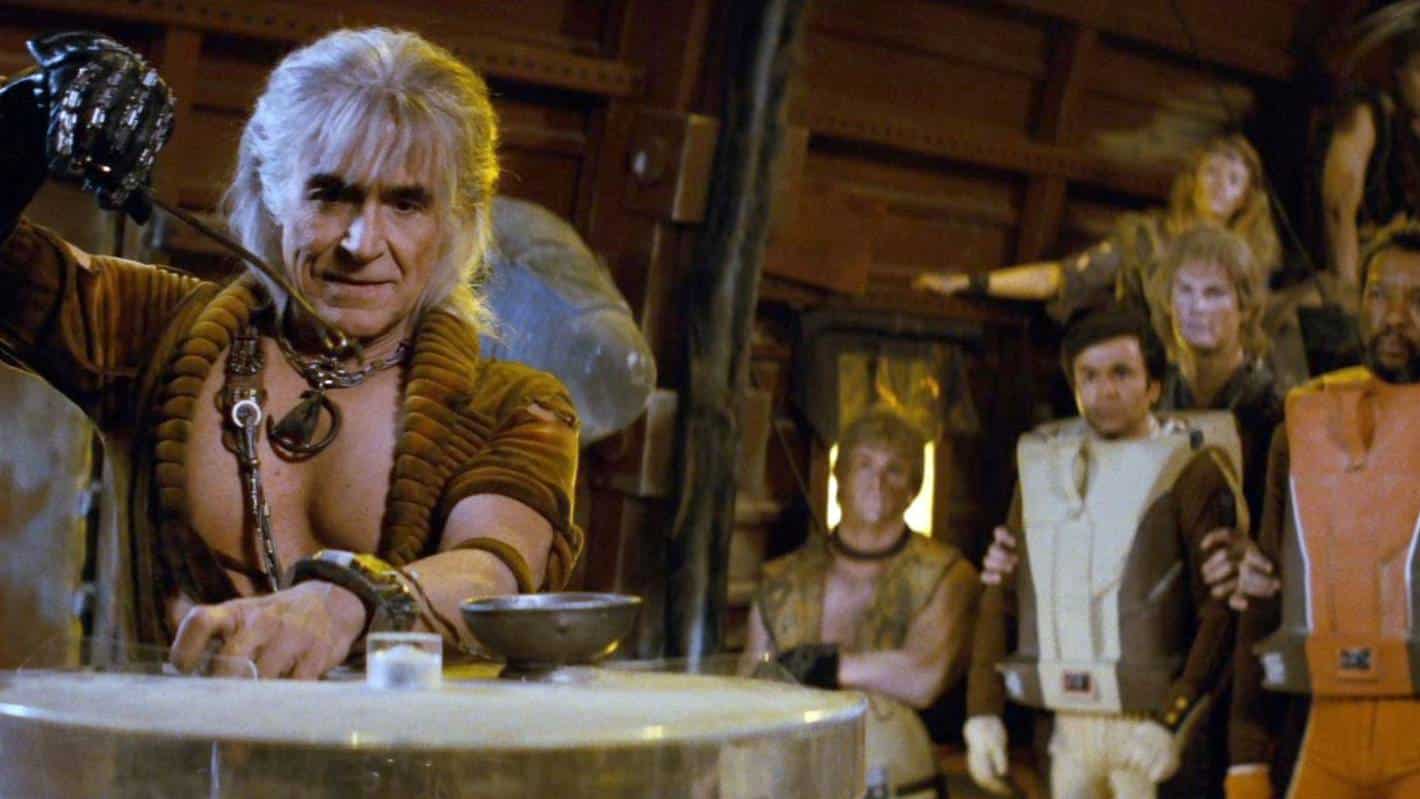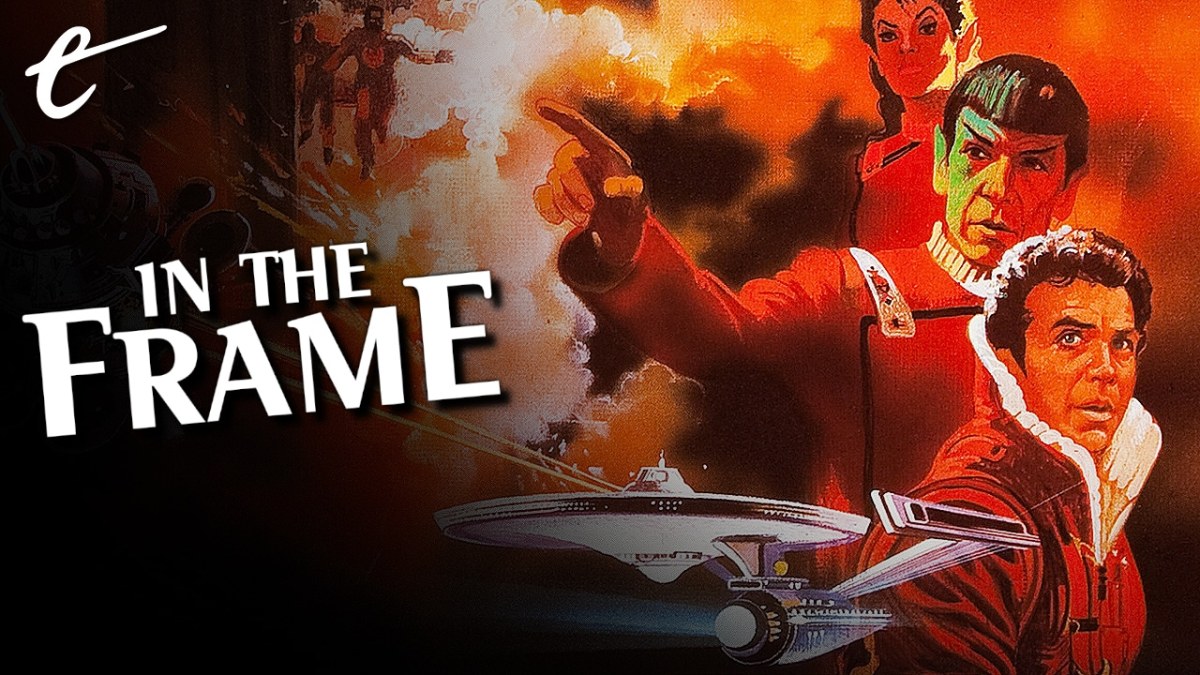Star Trek II: The Wrath of Khan is 40 years old this summer. It remains one of the very best Star Trek movies and would go on to radically reshape and redefine the franchise in the decades that followed. It is a bold and original take on Star Trek, an exciting reinvention of a concept that desperately needed a fresh perspective. It is also a franchise film that would struggle to get made today, in an era where studios are beholden to the whims of a fickle fandom audience.
Part of what makes The Wrath of Khan so brilliant is the way that it treats its central characters as actual people rather than as fetish objects. There is a solid argument to be made that The Wrath of Khan is the best story that the franchise ever told about James T. Kirk (William Shatner), and that comes from a willingness to acknowledge that he is a deeply flawed and complex human being. The Wrath of Khan understands that Kirk is interesting because he’s a person, not an ideal.
The Wrath of Khan is a story about ageing. The plot begins on Kirk’s birthday. The veteran space hero has been promoted to admiral. He no longer commands the Enterprise. He instructs students at Starfleet Academy. He has to wear reading glasses. Kirk himself seems to wonder whether his best years lie behind him rather than ahead. When a training cruise with a crew of cadets is interrupted by a distress call, Kirk seems excited at the prospect of adventure, even with an unqualified crew.
The past comes back to haunt Kirk in The Wrath of Khan. Back in the original show, Kirk opted to settle genetically engineered superman Khan Noonien Singh (Ricardo Montalbán) on the distant planet of Ceti Alpha V rather than consigning him to custody. Kirk seems to admire the genocidal madman, affording him the chance to “tame a world.” Though the film never makes it explicit, it seems likely that Kirk never even bothered to inform Starfleet of his decision.

When the Reliant scouts the Ceti Alpha system, Captain Terrell (Paul Winfield) seems to have no knowledge of Khan. The Reliant crewmember who seems vaguely aware that Khan might be somewhere nearby is Commander Pavel Chekov (Walter Koenig), who served on the Enterprise. The neighboring planet Ceti Alpha VI exploded shortly after Khan and his followers were settled. Kirk never thought to follow up — or even to ask Starfleet to follow up — on a figure as important as Khan.
The Wrath of Khan returns time and again to the idea that Kirk’s recklessness and irresponsibility are serious character flaws, rather than heroic virtues. At one point, he is reunited with his ex-girlfriend Carol Marcus (Bibi Besch) and gets to meet his adult son David (Merritt Butrick) for the first time. In the script, he asks Carol, “Why didn’t you tell me?” This would seem to imply that he never even knew he had a son. In the finished film, Kirk’s question is softened to, “Why didn’t you tell him?”
Kirk spends most of The Wrath of Khan refusing to believe in a “no-win” scenario. The film opens by establishing that Kirk was the only cadet to ever pass the “Kobayashi Maru” simulation designed to teach cadets the necessity of dealing with failure. Later on, Kirk concedes that he cheated. He reprogrammed the test. However, The Wrath of Khan presents Kirk with a no-win situation that he cannot cheat. The bill comes due, and Kirk has to settle his various accounts.
One of the smarter aspects of Star Trek II: The Wrath of Khan is the way that the film forces Kirk to come to terms with his own failings. The film doesn’t offer the character the easy way out, a redemptive death that excuses his past indiscretions. Instead, acknowledging what Kirk’s impulsive choices have cost characters like Khan and the Marcuses, it ends with Kirk’s best friend Spock (Leonard Nimoy) dying in front of Kirk’s eyes to save the ship. Kirk fails, and he doesn’t even get to be the hero.

The Wrath of Khan is a fantastic character study and a compelling tragedy. While the previous film, The Motion Picture, has a lot of charm as a guided tour of the Star Trek universe, The Wrath of Khan breathes life back into the Star Trek universe. It does this by being willing to break with what came before. The movie is appreciably more militaristic than the previous film or the television show. Its outlook is less utopian than that of The Motion Picture. It is not beholden to what Star Trek was.
“I was not a big Star Trek fanatic,” director Nicholas Meyer told Rolling Stone in September 1982. “I saw it as common, sometimes tragic human dilemmas served up in a pop allegorical format, but underlying it all was a kind of optimism that I do not share.” The film played fast and loose with Star Trek lore. Khan boasts that he recognizes Chekov. “I never forget a face,” he explains. However, Khan never met Chekov. Koenig wouldn’t be cast until the season after Montalbán’s guest spot.
Meyer was brazen about reinventing Star Trek. “Sometimes I think my specialty is working on things that haven’t quite realized their full potential,” he told The New York Times in June 1982. “Star Trek was in a way another idea that never quite fulfilled its potential. In the case of the weekly television series, they didn’t have the time or the money to do it, and the first film got lost in a maze of special effects. So I thought here was another opportunity to do what I do best – relief pitching.”
It is hard to imagine a modern director being so candid about their lack of familiarity with a property. JJ Abrams’ admission that he was not a Star Trek fan growing up became a cudgel to be wielded against him. It would be refreshing to hear the director of a modern franchise tentpole boast that they were finally going to fulfill potential that had so far gone undelivered. After all, what is the point of working on a property if a creator doesn’t think they can compete with what came before?

There was pushback against Meyer’s new take on Star Trek. Fan outrage and purity testing is not a new thing. Star Trek creator Gene Roddenberry had been marginalized by the studio after his petulant meddling on The Motion Picture, which included having his secretary intercept mail to swap in Roddenberry’s own earlier drafts for Harold Livingston’s later scripts. Roddenberry was reportedly furious about the changes that Meyer was making in The Wrath of Khan, seeing it as a betrayal of the franchise.
Roddenberry wrote a nine-page letter to screenwriter Harve Bennett, complaining that the film “departs considerably from the Star Trek format” by violating the principle of “perfected humans in an optimistic future.” Of course, this is precisely what makes The Wrath of Khan great. When these internal appeals didn’t work, Roddenberry leaked the script to fans in the hopes of stoking outrage. Roddenberry denied the leak, but historian Mark A. Altman notes that the source could be identified by “a code on each of the scripts.”
“Gene kept sabotaging us,” recalled producer Ralph Winter. Roddenberry knew he could harness fandom against his opponents. “Gene had a big part in the conventions early on,” noted producer Jon Povill. “Not just in terms of going and speaking there, but they were marketing ploys for him and Majel (Barrett) and Lincoln (Enterprises).” Roddenberry saw himself as a curator of the franchise. According to Altman, Roddenberry had “started drinking his own publicity at that point, and believed all this stuff.”
Roddenberry’s long-term associate Susan Sackett leaked news of Spock’s death to fans at a convention. “So if you don’t care for that idea,” Sackett reportedly told attendees, “it’s up to you to try to convince them.” It was a call to action, an attempt to mobilize a fandom terrified by something different. Fans reacted strongly, taking out advertisements in The Daily Variety and The Hollywood Reporter, demanding, “Why is Paramount deliberately jeopardizing $28 million in revenues?” Needless to say, the fans had it wrong.

Some fans took it further. Producer Robert Sallin received “death threats” from fans. He received a call on his home phone, warning, “If you kill Spock, we’ll kill you.” He had to employ security to protect his family. It wasn’t a single threat, but a sustained campaign. “They came fast and furious by mail and telephone for some time,” he explained. “In fact, the crazies kept it up until the premiere of the film.” It is a reminder that this sort of militant and reactionary fandom is nothing new.
Sadly, studios these days seem more willing to listen to these sorts of fans than to ignore them. As with Meyer’s later work on Star Trek VI: The Undiscovered Country, it is hard to imagine a modern franchise installment going quite as boldly as The Wrath of Khan. Movies like The Rise of Skywalker seem tailor-made to appease fans who had their expectations challenged or upended by earlier films. It’s hard to imagine Paramount letting Meyer make The Wrath of Khan today, despite (or because of) how brilliant it is.
Indeed, it is worth comparing the version of Kirk presented in The Wrath of Khan with the version that Paul Wesley played on the recent Star Trek spin-off, Strange New Worlds. In the first season finale, “A Quality of Mercy,” Captain Christopher Pike (Anson Mount) is visited by his future self. He witnesses an alternate version of “Balance of Terror,” where he commands the Enterprise instead of Kirk. This results in a nightmarish and dystopian future that Pike agrees must be avoided at any cost.
“A Quality of Mercy” is effectively an in-continuity take on the classic “Kirk vs. Picard” debate among fans, those arguments over which Star Trek lead is “better.” (In reality, each has their own merits.) The episode unequivocally sides with Kirk, painting the very recklessness and impulsiveness that The Wrath of Khan critiqued as virtues. This is a show that so worships what came before that even Kirk’s flaws are calcified into strengths to be celebrated.
The humanity that made The Wrath of Khan so compelling is washed away, acknowledging that there is no room for anything beyond blind reverence for what came before. The Wrath of Khan is too iconoclastic and too radical for modern Star Trek, as much as its signifiers might get repurposed and reused for easy nostalgia. Pike’s future self even wears the distinctive uniform jacket introduced in The Wrath of Khan. Forty years later, it doesn’t fit quite as well.





